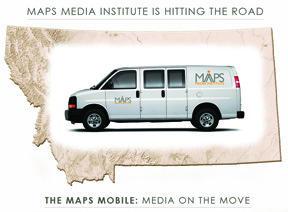“Making things happen” is what an entrepreneur does, says MAPS Media Institute founder and CEO Peter Rosten, and at the organization’s open house on Thursday, April 16, enterprising students were drawing on everything they had learned in order to launch a new initiative.
The open house was in celebration of “MAPS Day,” as proclaimed by the Ravalli County Commissioners in recognition of the program’s deep community support.
The MAPS students hope to create a mobile production facility for the next school year. In the process of realizing that dream, they’re getting a priceless education in entrepreneurship, while pulling together the threads of all that MAPS offers.
Let’s take a step back: the MAPS Media Institute is a stand-alone, after-school media arts program that provides free classes for Hamilton-area students in grades 8-12. They receive top-notch technical training in Filmmaking, Design, Music, and Technology.
The organization has grown “organically,” according to Rosten, and recently recognized the need for more focused business education. Now in their eleventh year, they decided last January to add “Entrepreneurship” to the curriculum, enabling students to convert their newly-acquired skills into a career.
“It’s the right time for this program,” said MAPS instructor Clare Ann Harff.
As a class project, the students brainstormed business ideas, and the idea of sharing the MAPS experience statewide, via a “MAPS Mobile,” quickly rose to the top. They envisioned a van, jammed with professional equipment and educational tools, ferrying students and instructors to other communities, providing free workshops for schools, veterans, seniors – any organization that could demonstrate a need for their services.
After working out a detailed proposal and a business plan, they convinced the program staff and sponsors to back the project—and to purchase a van. All they needed was $25,000 to purchase the production equipment, but they developed a plan for that, too: crowdfunding via Kickstarter.
Who-funding via what?
Harff laughed that, while the concept of creating a nationwide, online fund drive is familiar to her students, she’s had to explain the concept to less internet-savvy potential donors who simply want to write a check.
The Kickstarter website offers a platform for people to “pitch” their projects, via written narrative and a four-minute video, and to set a fundraising goal. Supporters can then “pledge” an amount, and if the pledges meet or exceed the goal within a 30-day window, their pledges will be collected, and their credit card charged.
Harff teaches in the Design and the Entrepreneurship programs. Tim Kolberg teaches Music and Entrepreneurship as well, and he said that of the 85 kids currently enrolled in the MAPS program, “one way or another, every one of them was involved” in creating and launching the campaign.
They had to create a graphic signature for the project, write the narrative, produce a video with music and images, and put together a business plan.
Kolberg said that 15-20 kids currently attend the entrepreneurship program, with 5-10 of them constituting the “core group” spearheading the project.
If the Kickstarter goal is reached, the van will become a state-of-the-art portable production studio, capable of teaching all of MAPS’ established curricula in one-day (or longer) workshops. MAPS instructors can adapt the programs to any class size, skill level, or project length.
The fully-equipped van would include all the necessary hardware and software to serve as a portable recording studio, including microphones and audio hardware; a full film production studio with cameras, lights, dollies, and more; a graphic design studio, with tablets (Ipads), and cameras; and a video game development studio, with computer workstations and software.
If they exceed their funding goal, they would use the extra funds to purchase a cargo trailer, and to augment the van’s equipment with laptops and additional audio and video production needs.
Harff explained that the MAPS Mobile project is designed not to detract from their existing offerings; the equipment will be dedicated to the mobile lab, rather than being “borrowed” from the classroom when needed. Operating costs are already written into the programs annual budget.
Harff and Kolberg noted that creating a business plan involved researching similar programs, to see how they operate, but found little.
“There were no national examples to go by,” Harff said. Some larger cities had stand-alone programs similar to MAPS, but no full, media-arts mobile capabilities.
“How will this take shape?” she asked. “We’re going to find out.”
It’s all part of helping students “find their voice,” a frequent theme in MAPS programming. Kolberg said that kids often have no idea that they might have an aptitude for something, simply because they’ve never had the opportunity to try it. MAPS provides those opportunities, and that is what they want to share with other Montana communities.
While the students clearly enjoy their classes, they also learn the lesson that success requires hard work. The instructors push the students when they see them blossoming. Student Galen Brush has played the guitar for eight years, but he said Kolberg encouraged him to start writing music, and to learn the piano as well. He’s now writing a score for a film that other students are producing.
During the Open House, Trinity Yeaman, another music student, was working out musical arrangements at the piano with her friend, Dee Dee Rogers. Yeaman said she’s in the MAPS program to “have fun and follow my dreams, and to become who I am.”
That’s the experience that 85 students and their instructors hope to share with the rest of Montana, when the MAPS Mobile reaches its funding goal.
To view or contribute to the Kickstarter campaign, go to www.mapsmediainstitute.com, and click on the Kickstarter/van icon. Interested donors can also visit the MAPS facility, at 515 Madison Street in Hamilton, where they can view the Kickstarter video, and get help making a donation, if needed. The funding campaign will run through May 16.

